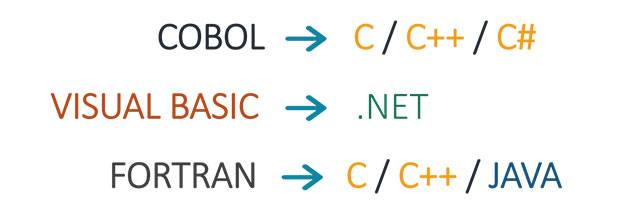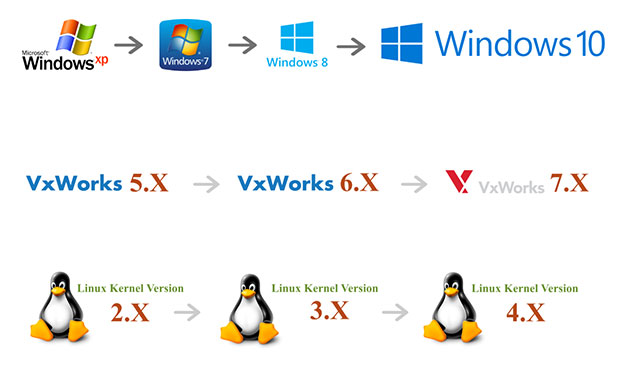MapuSoft Technologies (MT) is the number one provider of embedded software re-use solutions. Our development platform, AppCOE (Application Common Operating Environment ) integrates all of MapuSoft’s solutions in one host environment for easy porting, abstraction, simulation, testing and conversion. The included tools are OS Changer Porting Kit, Cross-OS Development Platform, Cross-OS Hypervisor, Linux OK, OS Simulator, OS Version UpKit, Ada-C/C++ Changer and application/platform profilers. We provide full source code with no royalties.
AppCOE™
Eclipse-based IDE for Host Porting, Abstraction, Simulation, Testing and Conversion
Application Common Operating Environment (AppCOE™) is a framework of common architecture that promotes interoperability and cross-platform capabilities among systems and devices. It is built on the powerful open source Eclipse-based framework and integrates all of MapuSoft’s tools: OS Changer®, Cross-OS Development Platform, OS Abstractor, Ada Changer, OS Simulator, OS Version UpKit™, RTOS Simulator, Automated language conversion, App/Platform Profiler™, Linux OK™ Embedded C, C++ and Ada applications can be standardized on AppCOE to allow the applications to interoperate and run seamlessly on a single platform.
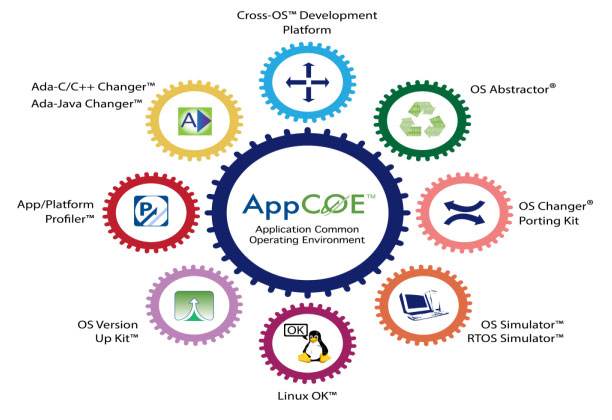
OS Changer®
Rapid Software Reuse on any Operating System with Performance Optimization
OS Changer® is a C/C++ source-level virtualization technology that allows you to easily re-use your software developed for VxWorks®, pSOS®, Linux/POSIX, Windows®, Nucleus®, ThreadX® and μITRON on another OS, while providing real-time performance. It eliminates the manual porting effort, saves money and shortens the time to market. The appropriate OS Changer Interface connects to your existing application that was developed on your current OS while the OS Abstractor® Target Specific Module (specific to your target OS) provides the connection to the OS you are moving to.
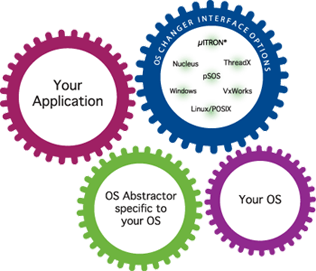
Why Change Your OS?
- Switch to an OS that offers support for your next generation hardware
- Switch to an OS that is more economical and/or requires no royalty payments
- Switch to an OS that is free and open-source
- Switch to an OS that provides better development tools
- Switch to an OS that offers a wide range of driver, protocol and middleware support
- Switch to an OS that offers you better performance and a smaller memory foot print
- Switch to an OS that meets your required certification standards
Cross-OS Development Platform™
Develop Once to Deploy on Multiple Platforms with Ease
Cross-OS Development Platform™ is a C/C++ source-level virtualization technology that provides a robust and industry standard OS interface architecture for flexible real-time application development, while allowing the user to protect the software from being locked to one OS. This negates future porting issues because the software will support multiple operating systems and versions from the beginning. It also eliminates the risk associated with the OS selection process, since the same application can be tested on multiple platforms for comparison and won’t be tied to the chosen OS.
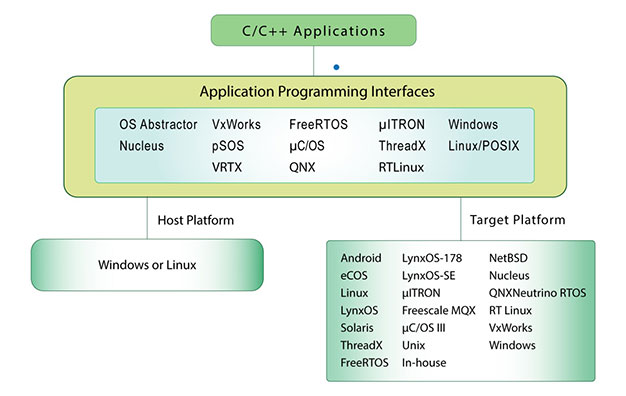
WHY CHOOSE CROSS-OS DEVELOPMENT PLATFORM?
- Eliminates the risk of being locked to a single OS for the life of a project or product
- Leverage automated software porting to save crucial time and money
- Increased robustness and performance of existing software with advanced real-time features
- Shorten the learning curve on a new OS by developing with the familiar APIs of the current OS
- Capture new markets by supporting many different operating systems and hardware types
- Available in full source code and royalty free
OS Abstractor
Separates The Code From The OS & Hardware Platform
OS Abstractor is a commercial grade abstraction layer designed to provide better performance at a lower cost than an in-house abstraction solution. Including OS Abstractor in your architecture creates a clear separation between the application code and the underlying OS, thereby freeing the code and minimizing any future upgrading costs. MapuSoft’s OS Abstractor is a highly reliable tool which is used worldwide among various industries for critical applications.
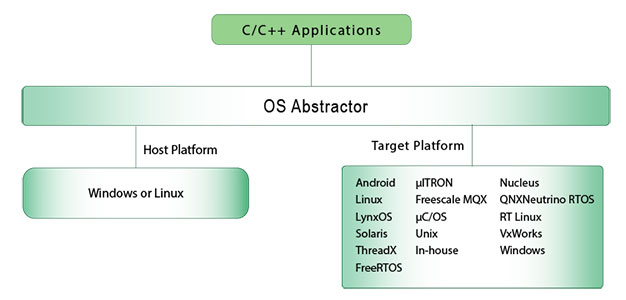
Why Choose OS Abstractor?
- OS Abstractor is a commercial grade product, it is designed to provide better performance and at a lower cost than an in-house abstraction solution.
- It protects your software investment by extending the life of your application code.
- OS Abstractor provides advanced development features and is capable of adding functionality to an existing OS.
- It includes performance enhancement features like re-using kernel resources and optimization of the abstraction code that is specific to your application.
- OS Abstractor eliminates time-consuming manual updates to the application code when there are changes to the underlying OS.
OS Simulator™
Develop and Test on a Virtualized Host without the Target Hardware
MapuSoft’s OS Simulator™ allows engineers to develop and test embedded applications on Windows or Linux host environments. OS Simulator eliminates the need for the original OS, as well as the requirement for expensive target hardware during development. Without the need for those components, development and testing can begin much earlier. The result is lower licensing costs, reduced hardware requirements and a shorter time to market.
OS Simulator also provides a virtualized test platform to simulate a system of applications interacting with each other on one or more CPU cores through simulated devices. Optionally, OS Simulator is available with source code to simulate embedded applications integrated with native tools/software on Windows or Linux target environments.
Available OS Simulators:
VxWorks® pSOS® Nucleus® ThreadX® Linux/POSIX Windows® micro-ITRON OS Abstractor™
Ada-C/C++ Changer™
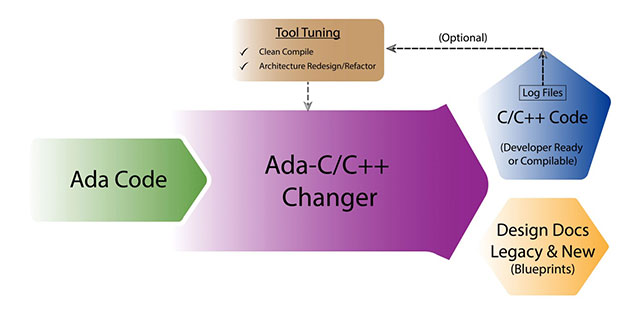
MapuSoft’s Ada-C/C++ Changer Features :
- Automatically convert Ada code to C++ and re-deploy your application.
- Eliminate the need for a costly and tedious code re-write for extensive cost and time savings.
- Error free tool that prevents mistakes made in the error prone task of a manual rewrite.
- Supports conversion of Ada 83 and Ada 95 source code to ANSI C++ 03 output.
- Preserves Ada comments, files structures and variable names for easier code maintenance. Converts Ada generics to C++ templates (In some cases, Ada generic can become a non-generic/non-template depending on original code).
- Supports Ada tasking and rendezvous constructs. Supports Calendar, System, Unchecked_Conversion, Record Representation Clauses, Variant Records, Declare Block Statements, Ada Tick Functions, Renames (for packages, variables, records, and types), “use” for packages and types, Ada Strings, access (including access all, access procedure, nested subroutines).
Add-on tool features and re-factoring services :
- Generate design documents of existing & new code. Transform Database and
- User-Interface implementation.
- Remove dead or redundant code/data. Merge and consolidate duplicate code/data.
- Reorganize and improve design in new code/data. Remove flaws in new code that originally existed in old .
- Create reusable optimization/packaging/redistribution modules.
- Integrate with modern parallel/multi processing and distributed/N-Tier operational environments.
- Modernization of legacy systems to multi-tier architectures.
- Modernization of flat file, hierarchical and legacy databases.
- Modernization of legacy UI to web or other modern UI.
- Re-factor to improve maintainability, security and performance.
- Custom pattern-based changes. Migration to modern cloud architectures.
- Testing & integration support solutions.
- Extraction of business rules from legacy systems
RTOS SIMULATOR
MapuSoft’s RTOS Simulator is a one-stop solution that makes all the popular RTOS platforms available to educational institutions, at a fraction of cost of a single proprietary OS. RTOS Simulator creates a development and testing environment on standard Windows/Linux personal computers. Students get hands-on experience developing real-world embedded software applications, improving their post-education marketability. Many students who have mastered embedded software development, now have lucrative jobs in a variety of industries, such as Mil-Aero, Electronics, Medical, Automotive, Telecommunication and many more.
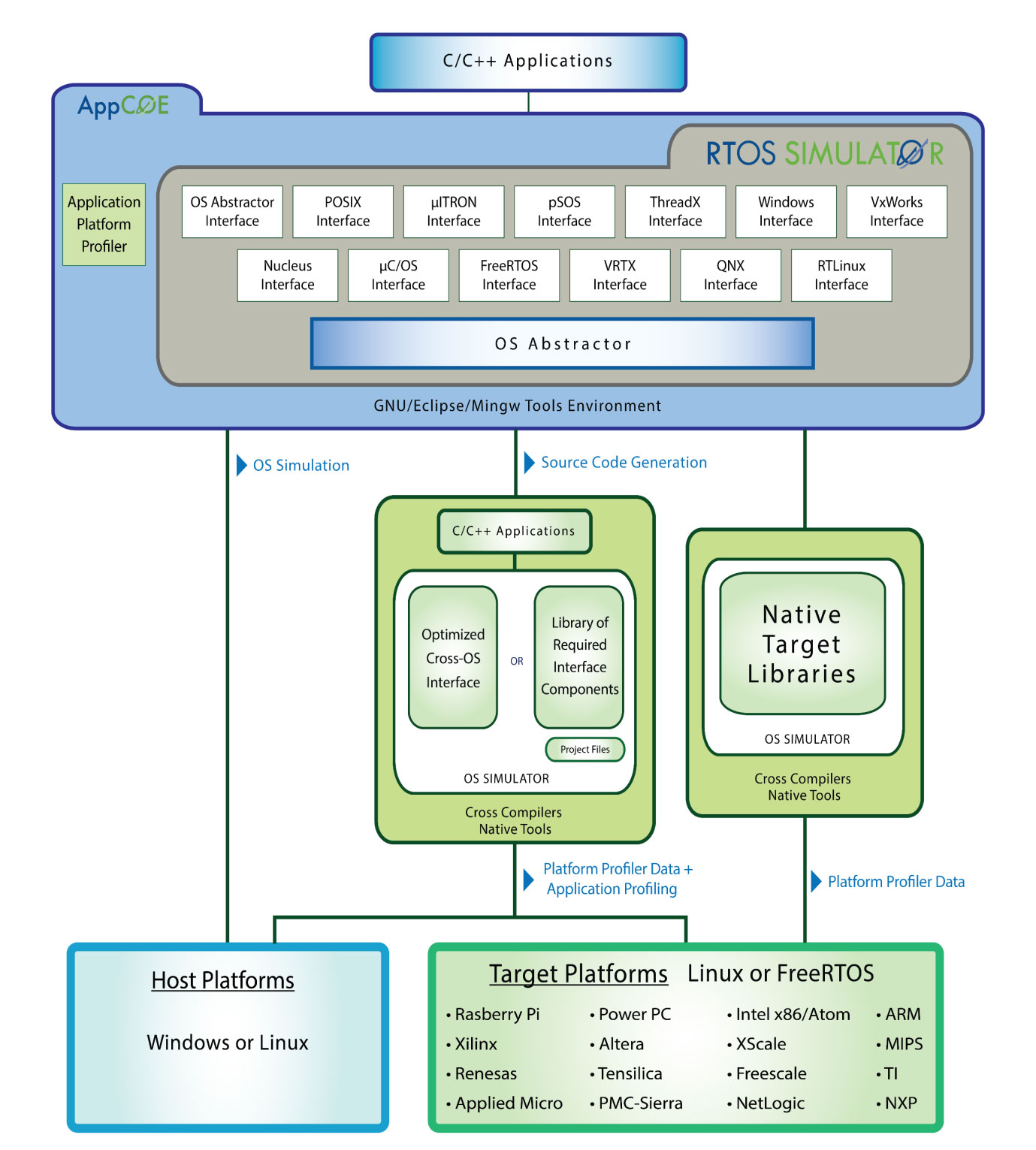
Cross-OS Hypervisor™
Consolidate Applications Developed for Multiple OS on a Single OS Platform
A typical hypervisor allows for running applications on multiple operating systems on a single hardware platform. Cross-OS Hypervisor™ is a next-generation hypervisor that eliminates the need for multiple operating systems by providing the OS functionalities required by the applications. This design ensures that applications are not locked into a particular OS platform and also simplifies development, reduces bill-of-material costs, and utilizes the system resources more effectively.
Cross-OS Hypervisor is redefining virtualization from wrapper-based implementations to source-level virtualization, thereby bypassing multiple layers of OS and hypervisor schedulers to gain performance increases. Cross-OS Hypervisor provides virtualization interfaces for POSIX/Linux, micro-ITRON, Windows®, VxWorks®, Nucleus®, ThreadX® and pSOS® applications.
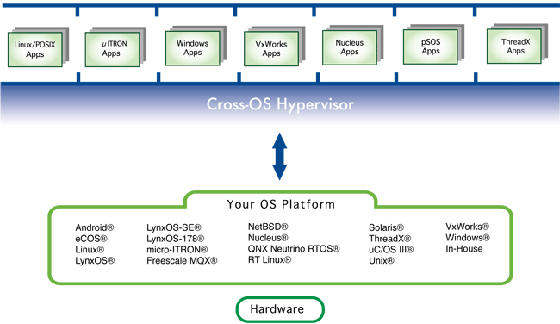
Linux Optimization Kit
Linux Optimization Kit: Increase Performance of Linux Applications
Developers are feeling additional pressure to get a performance increase from their embedded Linux due to increased real-time demands on applications, while having limited resources on their existing target hardware platform. To achieve additional performance, they will need to dig into the Linux operating system code to re-build the kernel and spend a considerable amount of time re-designing the application to improve performance.
MapuSoft’s Linux OK™ (Linux Optimization Kit) framework provides several kernel and application specific optimization features all aimed at increasing CPU performance, speeding up boot-time and reducing memory footprint for Linux applications.
The Linux Optimization Kit provides header files and template code to re-direct the application to use the Linux OK interfaces. It also generates optimized interface code, based on the level of individual API usage in the application, and according to GUI settings input by the user which captures resource requirements and target environment settings. Linux OK improves application performance by reducing run-time creation and deletion of OS resources by pooling and reusing them across applications/processes. Linux OK also reduces unnecessary task and user/kernel mode switching.
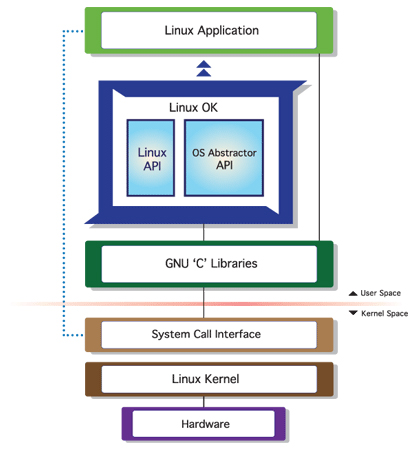
OS Version UpKit™
Automated – Language Conversion
Automated Software Language Conversion and Documentation Generation.
Automated Code-Changer converts the application code from over 30 programming languages into modern languages. The power of model-based automation increases efficiency and accuracy, while significantly reducing cost, errors and risk. Automated Code-Changer also has the capability to create automated documentation for either the old or new code. There is no size limit to either the code conversion or the creation of documentation.
